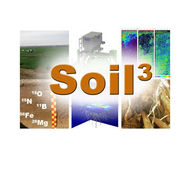Short-term effects of in-row subsoiling and simultaneous admixing of organic material on growth of spring barley (<i>H. vulgare</i>) (2017.0)
Jakobs I., Schmittmann O., Schulze Lammers P.
Soil Use and Management, 33 (4), 620-630
Abstract
Previous studies have shown that deep tillage, so-called subsoiling, is beneficial for yield development, and that tillage of deeper soil layers can promote water and nutrient availability during dry periods. The application of composts to the topsoil has been widely studied and evaluated, and it has been shown to improve soil stability and plant N uptake. These effects can differ over time depending on the compost type. Since dry periods have become more frequent, sustainable soil tillage and fertilizer practices must be developed. A combination of deep soil tillage and compost application might be a way to ensure proper plant supply during dry periods. Therefore, a field experiment on spring barley growth was carried out to evaluate the short-term effects of in-row subsoiling with simultaneous admixing of compost. Two types of composts and one organic fertilizer (Bio: decomposed organic waste, Green: decomposed green cuttings and CM: cattle manure) were admixed into the subsoil, and a control treatment received single deep loosening (DL) to a depth of 0.6 m. Yield development, yield parameters and grain quality were analysed and showed that the DL and Bio treatments resulted in the highest yields, and a significantly increased ear density and number of kernels. The TKW (100-kernel weight) of the CM treatment was significantly lower than the other treatments. In all treatments, a clear trend of decreasing yields with increasing distance from the subsoil tillage was observed. Thus a subsoil tillage every meter can increase overall yield development and offers a new perspective for sustainable crop production.
